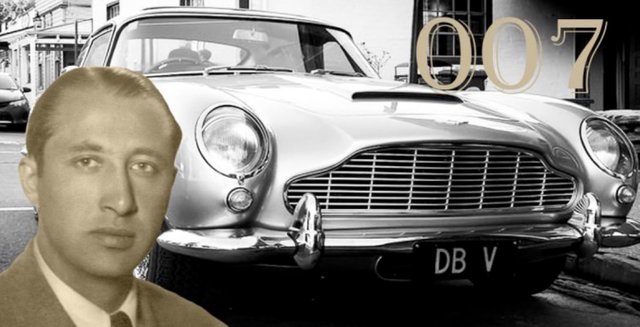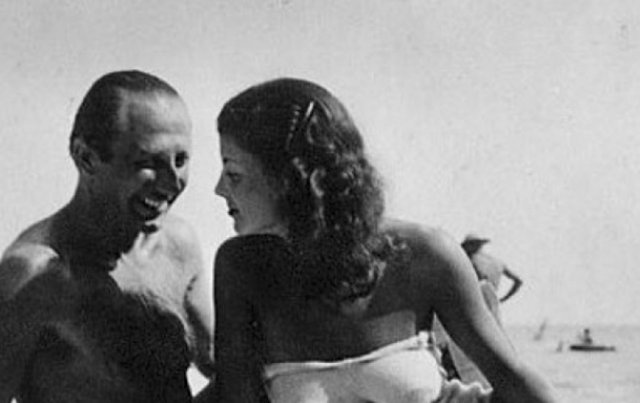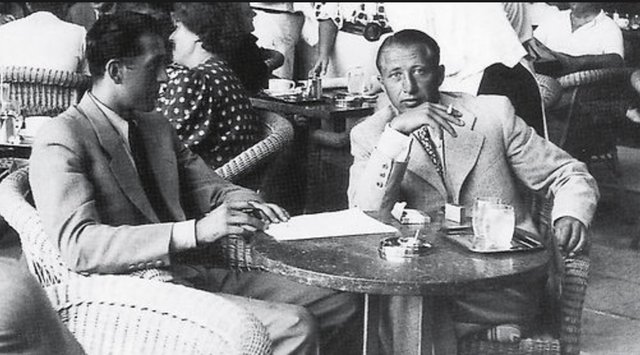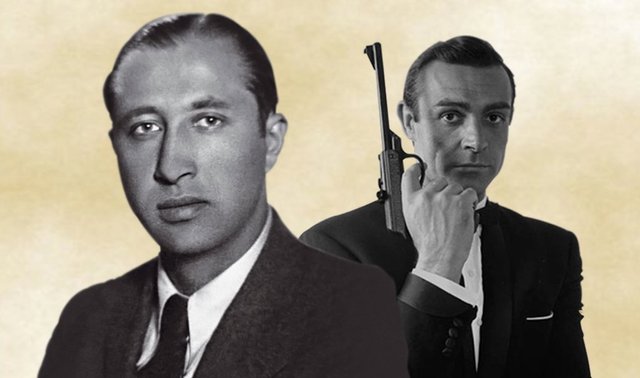Dusan Popov: The double spy, that inspired James Bond

J.. Edgar Huver (1895-1972) was one of the most powerful and fearsome men in the United States, director of the Bureau of Investigation, later the FBI, from 1924 until the year of his death. No US president had the courage to retire, as he had compromising dossiers for all political leaders, so much so that President Herri Truman called on an FBI case as Huver's "secret police".
Hover's figure is surrounded by many shadows: he was an uncompromising anti-communist, and persecuted, even with illegal methods, all who supported radical ideas. However, he stubbornly denied the presence of organized crime in the United States (or the Mafia) until he was forced to admit his existence in 1957.
During his career, he persecuted black-law activists (in 1964 he sent an anonymous letter to Martin Luther King, inviting him to suicide), the women (by dismissing all female agents of the Federal Bureau), and was accused that he had not fully investigated the killing of President John F. Kennedy.
Conservative up to the marrow, he could not tolerate persistent rumors about his alleged homosexuality, which the controversial writer Truman Kapote (a declared gay) was keen to circulate.
Huver did not trust foreigners, and therefore underestimated information received by a UK-spy who warned him of a possible attack on Pearl Harbor, and caused the United States to enter the War Second World.

Huver did not trust Dusko Popov, a man who represented everything he hated: he was a woman's lover, loved sports cars and games of chance, and was more of Yugoslav origin. A man so skilled in his double spy work and with such an unusual life that inspired Jan Fleming to create his famous character, legendary agent James Bond / 007.
A source of inspiration so concrete that some real facts of Popov's life are shown as adventure lived by Bond himself. Jan Fleming was himself a secret agent serving the United Kingdom, and in that role he had the opportunity to know even controlling the activity of Dusko Popov, with whom he shared the passion for strong alcoholic beverages and women.
One evening in 1941 at a casino in the Estoril city of Portugal, Popov threw a tremendous amount of time on the table ($ 40,000) just to challenge a more crazy player than he did. The money Popov had received from the Germans to organize a spying network in England would actually end in British M16 coffers.
Given the fame of Popov, the British placed it under the supervision of Fleming, who was shocked (and fascinated) by the indifference shown by Popov, to the possibility of losing such a sum, which, moreover, did not belonged to him.
The scene, perhaps a bit exaggerated by Popov, is recaptured in James Bond's "Casino Royale" series, although Fleming gave another version of that casino evening. If the writer had known Popov long ago, he would not have been so surprised by his behavior.

Dusan "Dushko" Popov was born in Serbia in 1912, in a wealthy and educated family, which did not pay much attention to travel and education expenses for her children. After graduating from jurisprudence, Popov went to Germany's Frajburg to defend his doctorate. It was 1934, and Germany was already experiencing the Nazi delusion, burning books, persecuting Jews, and building the first concentration camps.
At that time Popov was not interested in politics, but more on sports cars and girls, the passion he shared with a German friend, Johan Jebsen, rich and careless as himself. But in the past two years in Frajburg, young Dusan was well aware of what was the true face of Nazism, and he even had the courage to mock him publicly, thinking he, a Serb, had no obligation to show loyalty to Hitler.
In the summer of 1937, after completing the PhD, Popov was about to go to Paris to celebrate the completion of his studies. But he did not succeed when he was arrested by the Gestapo, with the charge of being a communist, putting him in jail without any formal judgment.
He was his friend Jebsen, who informed Popov's father of what happened, who managed to release his son thanks to the influential friendships he had. In 1940, Jebsen told Dushan that he had become part of the German secret service, Abvehr, to avoid recruiting German army, Vermaht, and proposed to enter.
Popov accepted, but only after consulting with the British intelligence service: he would play a double game in favor of allied forces, with the code-named "Triptych" (just as Jebsen did, but ended up in a concentration camp , most likely dead).

In 1941, Abvehr sent a mission to the United States to organize a spy network, and to investigate several German intelligence targets. Demand for very detailed information on Pearl Harbor led Popov to suspect that the American fleet stationed in Hauai was in serious danger.
On August 12, 1941, Popov informed Huver about the near danger, but the suspicious FBI head did not report to his superiors. After returning from the United States (Huver ordered him to leave the country immediately), Popov moved to London, where he actively contributed to the "Fortitude" operation, part of the deeper misleading strategy called "Bodyguard."
The rout in Normandy was also successful thanks to Popov, who succeeded in persuading the Germans that Allied forces would deploy to Kale.
Like James Bond, as he carried out dangerous war operations, Popov did not give up his lifestyle as a playboy and gambler, as he later wrote (perhaps a little bit excessively) his memories of "Spiuni against Spy" , published in 1974.
In 1981, Popov's physician surrendered in the face of excesses with alcohol and tobacco: the secret agent died at the age of 69, 17 years after Jan Fleming, the writer who had shaken that strange 1941 evening at the Estoril casino. / "Vanilla Magazine" - In Albanian by @Helamia
Blog in Albanian Below :
Dushan Popov: Spiuni i dyfishtë, që frymëzoi Xhejms Bondin

Xh. Edgar Huver (1895-1972), ishte një nga burrat më të pushtetshëm dhe të frikshëm në Shtetet e Bashkuara, drejtor i Byrosë së Hetimeve, që më vonë u bë FBI, nga viti 1924 deri në vitin e vdekjes së tij. Asnjë president amerikan, nuk pati guximin ta nxjerrë në pension, pasi ai kishte dosje kompromentuese për të gjithë udhëheqësit politikë, aq shumë sa që presidenti Herri Truman e quajti në një rast FBI-në si “policinë sekrete” të Huver.
Figura e Hover rrethohet nga shumë hije:ishte një anti-komunist i paepur, dhe persekutoi, madje edhe me metoda të paligjshme, të gjithë ata që mbështesnin ide radikale. Megjithatë, mohoi me kokëfortësi praninë e krimit të organizuar në Shtetet e Bashkuara (ose mafias), derisa u detyrua të pranojnë ekzistencën e tij në vitin 1957.
Gjatë karrierës së tij, përndoqi aktivistët e të drejtave të zezakëve (në vitin 1964 ai i dërgoi një letër anonime Martin Luter Kingut, duke e ftuar atë të vetëvritej), gratë (duke pushuar të gjithë agjentët gra të Byrosë Federale), dhe u akuzua se nuk e kishte hetuar plotësisht vrasjen e presidentit Xhon F.Kenedi.
Konservator deri në palcë, ai nuk mund të toleronte thashethemet e vazhdueshme në lidhje me homoseksualitetin e tij të dyshuar, të cilat shkrimtari kontrovers Truman Kapote (një homoseksual i deklaruar), kishte shumë qejf t’i qarkullonte.
Huver, nuk i besonte të huajve, dhe për këtë arsye nënvlerësoi një informacion të marrë nga një spiun në shërbim të Britanisë së Madhe, që e paralajëmroi mbi një sulm të mundshëm mbi Pearl Harbor, dhe që shkaktoi hyrjen e Shteteve të Bashkuara në Luftën e Dytë Botërore.

Huver nuk i besoi Dushko Popov, një njeri që përfaqësonte gjithçka që ai urrente:ai ishte një qejfli grash, dashuronte makinat sportive dhe lojërat e fatit, dhe ishte për më tepër me origjinë jugosllave. Një njeri aq i aftë në punën e tij të spiunit të dyfishtë, dhe me një jetë kaq të pazakontë, sa që frymëzoi Jan Fleming në krijimin personazhit të tij të famshëm, agjentit legjendar Xhejms Bond/007.
Një burim frymëzimi aq konkret, sa që disa fakte të vërteta të jetës së Popov, tregohen si aventura të jetuara nga vetë Bond. Jan Fleming, ishte vetë një agjent sekret në shërbim të Mbretërisë së Bashkuar, dhe në atë rol ai pati mundësinë të njihte madje edhe kontrollonte veprimtarinë e Dushko Popov, me të cilin ai ndau pasionin për gratë dhe pijet e forta
alkoolike.
Një mbrëmje më 1941, në një kazino të qytetit Estoril në Portugali, Popov hodhi mbi tavolinë një shumë të jashtëzakonshme për kohën (40.000 dollarë), vetëm për të sfiduar një lojtar edhe më të çmendur se ai. Ato para që Popov i kishte marrë nga gjermanët, për të organizuar një rrjet spiunazhi në Angli, do të përfundonin në fakt në arkat e britanikes M16.
Duke pasur parasysh famën e Popov, britanikët e vunë nën mbikëqyrjen e Fleming, që mbeti i tronditur (dhe i hipnotizuar) nga indiferenca e treguar nga Popov, ndaj mundësisë së humbjes së një shume të tillë parash, e cila për më tepër, nuk i përkiste atij.
Skena, ndoshta pak e ekzagjeruar nga Popov, është risjellë në serinë “Casino Royale” të Xhejms Bond, edhe pse Fleming dha një version tjetër të asaj mbrëmjeje në kazino. Nëse shkrimtari do ta kishte njohur Popov prej kohësh, nuk do të kishte mbetur edhe aq i habitur nga sjellja e tij.

Dushan “Dushko” Popov lindi më 1912 në Serbi, në një familje të pasur dhe të arsimuar, e cila nuk i kushtonte rëndësi shpenzimeve për udhëtimet dhe edukimin e fëmijëve të saj. Pasi u diplomua në jurisprudencë, Popov shkoi në Frajburg të Gjermanisë për të mbrojtur doktoraturën. Ishte viti 1934, dhe Gjermania po përjetonte tashmë delirin nazist, me djegie librash, persekutim të hebrenjve dhe ndërtimin e kampeve të para të përqendrimit.
Asokohe Popov nuk ishte i interesuar mbi politikën, por më shumë mbi makinat sportive dhe vajzat, pasione që ai i ndau me një mik gjerman, Johan Jebsen, i pasur dhe i shkujdesur si ai vetë. Por në 2 vitet e kaluara në Frajburg, i riu Dushan e kuptoi mirë atë që ishte fytyra e vërtetë e nazizmit, dhe pati madje guximin për ta përqeshur publikisht, duke menduar se ai, një serb, nuk kishte asnjë detyrim për të treguar besnikërinë ndaj Hitlerit.
Në verën e vitit 1937, pas përfundimit të doktoraturës, Popov ishte gati të shkonte në Paris për të kremtuar përfundimin e studimeve të tij. Por nuk ia doli, pasi e arrestoi Gestapo, me akuzën se ishte komunist, duke e futur në burg pa asnjë gjykim formal.
Ishte miku i tij Jebsen, ai që vuri në dijeni babain e Popov për atë që ndodhi, që arriti ta lironte djalin e tij falë miqësive me ndikim që kishte. Në vitin 1940, Jebsen i tha Dushanit se ishte bërë pjesë e shërbimit sekret gjerman, Abvehr, për të shmangur rekrutimin në ushtrinë gjermane, Vermaht, dhe i propozoi të hynte dhe ai.
Popov pranoi, por vetëm pasi u konsultua me shërbimin inteligjent britanik:ai do të bënte një lojë të dyfishtë në favor të forcave aleate, me emrin e koduar “Triçikli” (ashtu si bëri në fakt edhe Jebsen, që megjithatë përfundoi në një kamp përqendrimi, ku me shumë gjasa vdiq).

Në vitin 1941, Abvehr e dërgoi në një mision në Shtetet e Bashkuara, për të organizuar një rrjet spiunazhi, dhe për të hetuar disa objektiva të zbulimit gjerman. Kërkesa për informacione shumë të detajuara mbi Pearl Harbor, bëri që Popov të dyshonte se flota amerikane e stacionuara në Hauai, ndodhej në një rrezik serioz.
Më 12 gusht 1941, Popov informoi Huver mbi rrezikun e afërt, por kreu dyshues i FBI-së nuk raportoi tek eprorët. Pasi u kthye nga Shtetet e Bashkuara (Huver e urdhëroi të largohej menjëherë nga vendi), Popov u zhvendos në Londër, ku kontribuoi në mënyrë aktive mbi operacioni ”Fortitude”, pjesë e strategjisë më të gjerë mashtruese të quajtur “Bodyguard”.
Zbarkimi në Normandi, ishte i suksesshëm edhe falë Popov, që arriti t’i bindë gjermanët se forcat aleate do të zbarkonin në Kale.
Ashtu si Xhejms Bond, teksa kryente operacione të rrezikshme të luftës, Popov nuk hoqi dorë nga stili i tij i jetesës si një playboy dhe lojtar kumari, pasi shkroi më vonë (ndoshta paksa në mënyrë të tepruar) kujtimet e tij “Spiuni kundër spiunit”, botuar më 1974.
Në vitin 1981, fiziku i Popov u dorëzua përballë teprimeve me alkoolin dhe duhanin:agjenti sekret vdiq në moshën 69-vjeçare, 17 vjet pas Jan Fleming, shkrimtarin që e kishte tronditur atë mbrëmje të çuditshme të vitit 1941 në kazinonë e Estoril. / “Vanilla Magazine” – Në shqip nga @helamia.

Thank you very much to every single follower and all steamians who support me.
Also big thanks goes to @busy.org & @busy.pay for huge support to minnows like me and so many other minnows of the steemit community .
So join https://busy.org and lets make steemit community better together.
You can also join me at: https://busy.org/i/@helamia
Take some time to check more of my blogs. You might find something that interests you or learn something new. Best regards from @helamia .
If you wish to contact directly or just want to add me. Follow the links below where u can add / follow me:
https://web.facebook.com/Hilmi.Bojaxhiu
https://www.instagram.com/hilmibojaxhiu/
https://twitter.com/HilmiBojaxhiu
Very interesting story @helamia! 👌👌
Thank you @adazone